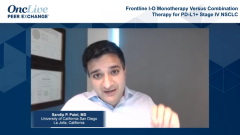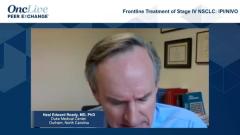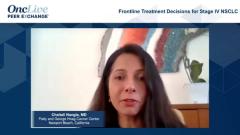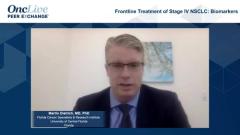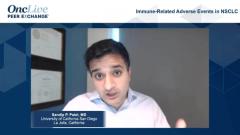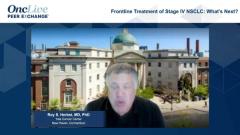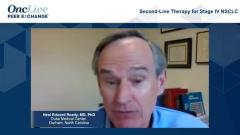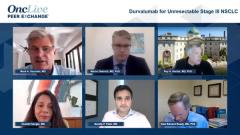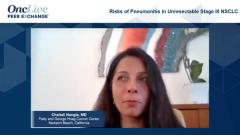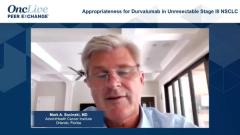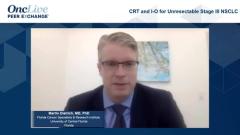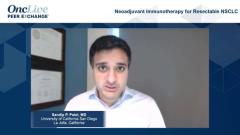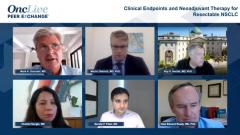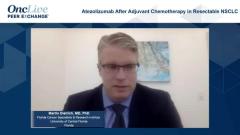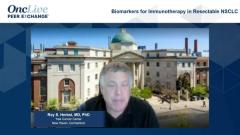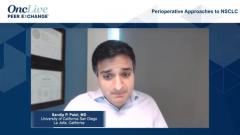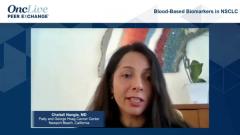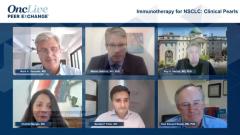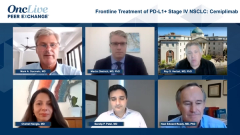
Frontline Treatment of Stage IV NSCLC: IPI/NIVO
Neal Edward Ready, MD, PhD, describes which patients with stage IV non–small cell lung cancer may benefit from the combination of ipilimumab and nivolumab in the frontline treatment setting.
Episodes in this series

Mark A. Socinski, MD: As you point out, we’ve had a flurry of wealth with all of these positive trials, most of which have led to FDA approval, so these options are out there for patients. One of the options, I’m going to ask Neal Ready to comment on his perspective with regard to what we call the chemotherapy-free combination of the nivolumab and ipilimumab, that stems out of the CheckMate 227 trial. We recently had an update with further follow-up at ASCO [American Society of Clinical Oncology Annual Meeting] 2021. Neal, give us your thoughts on how this fits into the landscape of everything Sandip {Patel] just reviewed very nicely for us.
Neal Edward Ready, MD, PhD: Thank you, Mark. As Roy pointed out, it’s very impressive that we’re seeing with I/O [immuno-oncology] therapy really durable responses that we didn’t see with chemotherapy before. We’re seeing five-year survival, and the thought has been that, with combination immunotherapy, that we would get a higher number of durable responses and really push up our four- and five-year survival rate, which is our goal. Nivolumab and ipilimumab, with the addition of a CTLA4 inhibitor, is a logical choice. In a large, randomized phase 3 trial, nivolumab and ipilimumab gave superior survival compared with chemotherapy alone in the PD-L1–positive group. That has been a durable benefit.
At the most recent ASCO 2021, the four-year survival rate, or overall survival, duration of responses, progression-free survival, have all held up to show a promising result for combo immunotherapy. This was planned for the PD-L1–positive group based on CheckMate 012, which was a big phase 1 trial. In that trial, we were looking to get the right dose. The ipilimumab, 1 mg/kg every 6 weeks, turned out to be a feasible, safe dose in lung cancer. That trial was phase 1, so we were trying to look at other populations, groups of patients who might not benefit from single-agent I/O.
In the cohort of 77 patients that we used to identify biomarkers for planning CheckMate 227, there were 12 EGFR-mutated patients. They undoubtedly were in the PD-L1 zero and low group. It led to CheckMate 227 being planned for PD-L1–positive because it really looked like nivolumab-ipilimumab was better on the high PD-L1. But when we look at the big phase 2 trials, CheckMate 568 and CheckMate 227, where EGFR mutations and ALK were excluded, it really looks like it was in the low–PD-L1 group, either PD-L1 less than 1%, or PD-L1 low, where we saw the biggest benefit. As my partner says, if your PD-L1 is low, you need tumor-infiltrating lymphocytes. But if your PD-L1 is really high, you have them. You don’t need CTLA4 to get them. In a large trial that Merck ran of pembrolizumab with or without ipilimumab, there was no benefit. In the high–PD-L1 group, over 50%, you probably don’t need the ipilimumab. PD-1 checkpoint antibody is enough. But from my perspective, in patients who look like they should have antigens that the immune system could identify—PD-L1 less than 1%, PD-L1–positive, and especially if tumor mutational burden is high—those are the patients who can benefit from combined I/O therapy. That’s how I look at things.
TRANSCRIPT EDITED FOR CLARITY


